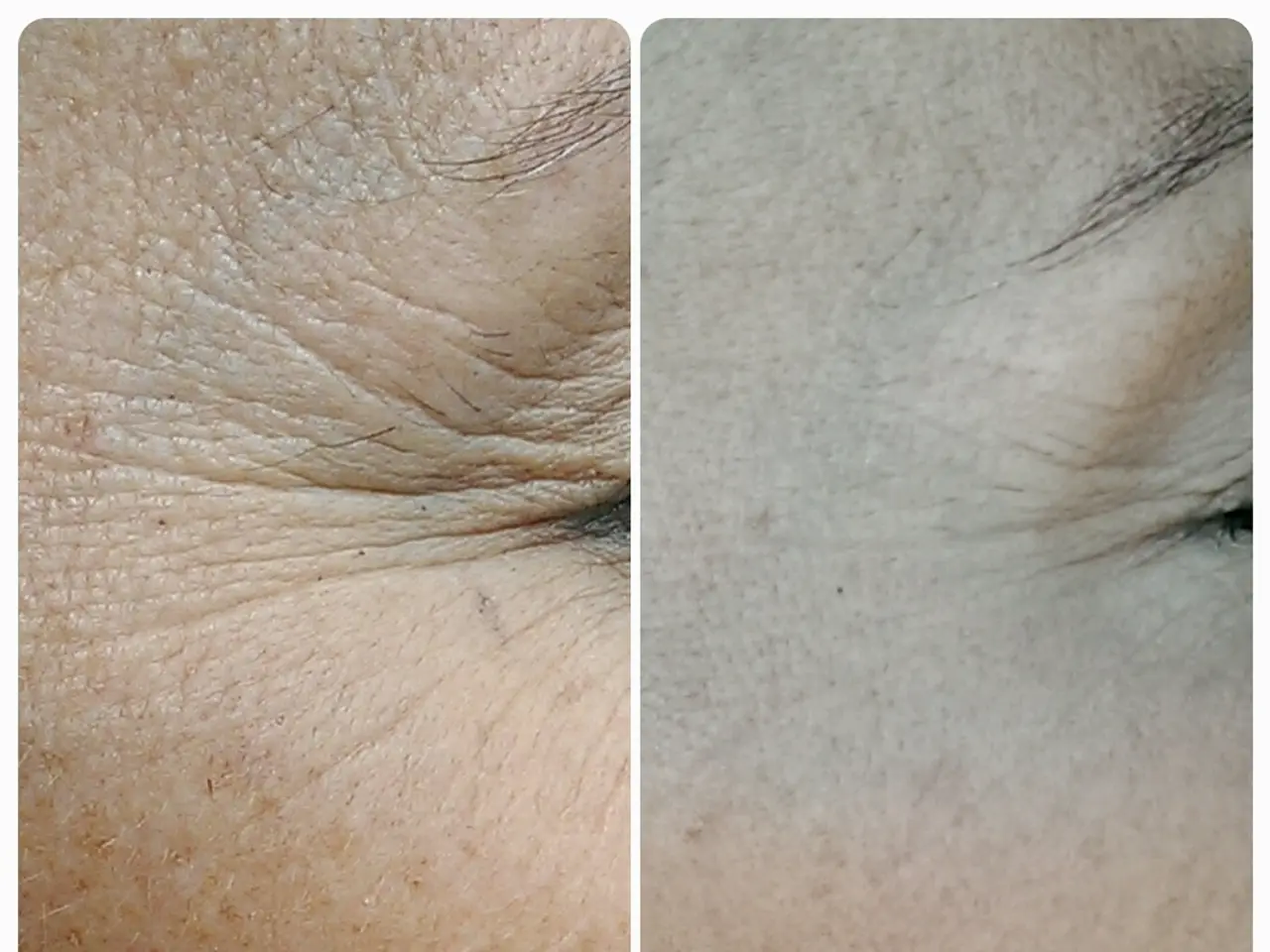Cream Battle: Synergies, Distinctions, and Application Strategies for Serums and Moisturizers
=========================================================================
Face serums and moisturizers are essential components of a well-rounded skincare routine. These products, while sharing the common goal of maintaining healthy, radiant skin, differ in their formulations, purposes, and how they interact with the skin.
Face serums are lightweight, thinner, and contain smaller molecules that penetrate deeply to deliver concentrated active ingredients targeting specific skin concerns such as fine lines, dark spots, or dullness. On the other hand, moisturizers are thicker, creamier products designed mainly to hydrate the skin and lock in moisture by forming a protective barrier on the surface, also shielding the skin from environmental stressors.
In a skincare routine, serums are applied after cleansing and toning but before moisturizing to allow their potent ingredients to penetrate deeply. Moisturizers are applied last to seal in hydration and protect the skin. This sequence optimizes the benefits of both products, with serums addressing targeted issues and moisturizers providing lasting hydration and protection.
To summarize:
| Aspect | Face Serum | Moisturizer | |---------------------|----------------------------------------------------|-----------------------------------------------| | Consistency | Thin, gel or water-like | Thicker, creamy | | Molecular size | Small molecules, penetrate deeply | Larger molecules, work mostly on skin surface | | Purpose | Target specific skin concerns (e.g., aging, pigmentation) | Hydrate and lock in moisture, protect skin surface | | Application timing | After cleansing and toning, before moisturizer | After serum, as the final hydrating step |
Using both in combination enhances overall skin health by addressing both specific problems (serum) and general hydration and protection (moisturizer).
For instance, the Brightwave 10% Vitamin C + Peptide Brightening Serum, with a rating of 4.9/5 and costing $45.00, helps reduce dark spots, even skin tone, and enhance radiance. Pairing it with a suitable moisturizer like the Supermello Hyaluronic Gel Cream Moisturizer can provide a comprehensive skincare solution, addressing deep and surface-level needs.
Remember, choosing the right serum and moisturizer for your skin type and concerns is crucial. Factors such as understanding your skin type, skin concerns, checking ingredients, patch testing, reading reviews, and consulting a dermatologist can significantly improve your skincare routine.
Whether you have oily, dry, or combination skin, incorporating both serums and moisturizers into morning and night routines can contribute to optimal skin health. Always apply these products correctly to create the best skincare routine.
[1] The Ultimate Guide to Face Serums [2] The Importance of Moisturizers in Your Skincare Routine [3] How to Use Face Serums for Best Results [4] The Difference Between Face Serums and Moisturizers [5] The Best Face Serums for Every Skin Concern
- Vegan skincare brands often include benzoyl peroxide as an acne-fighting ingredient in their product lines, catering to those with acne-prone skin who follow a cruelty-free lifestyle.
- Sunscreen plays a vital role in any skincare routine, especially for those with sensitive skin, as it helps protect the skin from harmful UV rays that can exacerbate skin issues.
- Hyaluronic acid, a popular ingredient in skincare products, is beneficial for all skin types, as it helps retain moisture in the skin and strengthen the skin barrier.
- In addition to serums and moisturizers, other skincare essentials include eye creams and cleanser, which are crucial for maintaining the health and wellness of the entire facial region.
- Some common ingredients in skincare products, such as salicylic acid and retinol, are known for their ability to increase cell turnover, thereby improving the overall appearance and health of the skin.
- Niacinamide, a versatile ingredient found in skincare products and health-and-wellness supplements, can help brighten the skin and improve its overall texture.
- Science plays a significant role in the development of innovative skincare products, with extensive research being conducted to discover new ingredients and formulations that serve the diverse needs of women's health and skincare.
- By following a well-rounded skincare routine that includes cleansing, toning, and using face serums, moisturizers, and other essential products, individuals can promote healthier, more radiant skin.
- Skincare routines should be tailored to individual needs and concerns, with users taking into account their skin type, specific skin issues, and consulting with dermatologists or skin-care professionals for advice on product selection and usage.




